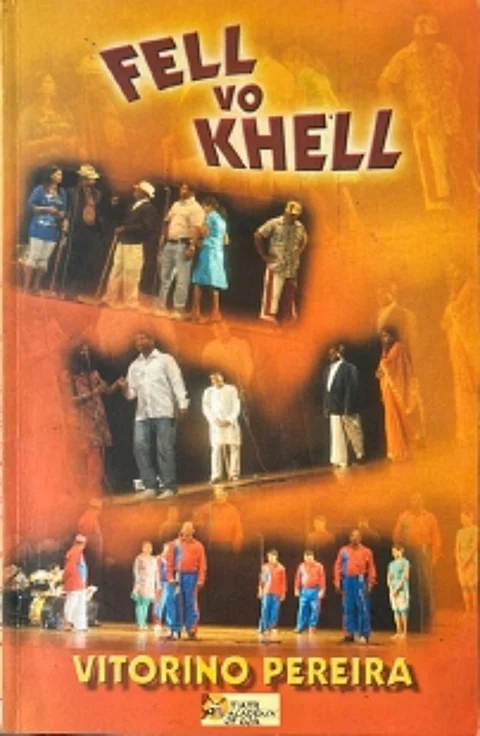

Rich contributions made towards art, culture or industry never go unnoticed. Even if you pass by from this world, the legacy left behind will be there for all to see and enlighten, enrich future generations to come.
Utorda-based Benicio Vitorino Pereira popularly known as Vitorino Pereira in the tiatr circle, was born on August 23, 1943 in Kottombi, Quepem to Santiago Pereira and Antonia Moraes. He completed his primary education in Marathi at his birth place.
Pereira was noted for his folk plays and during the Carnival festival in the state he took pains to pen and train people in popularizing this traditional folk art. ‘Zomnivhele fell’ or folk plays were quite popular in Salcete taluka during the three-day Carnival festivities.
And to keep those folk plays alive for generations to come, Pereira was instrumental in scripting, directing and staging them in several villages. Folk plays are usually being enacted in an open space and on a flat surface or the ground instead of the stage and the villagers flock to watch them at nook and corner of the village.
Scripting, directing and staging of ‘zomnivhele fell’ is an art and not everyone has it in them. There are a lot of intricacies involved and unlike the tiatrs on stage which carry the main play, songs and comedy, these three folk plays by each director have only one opening song and numerous ‘cantos’ entwined in each play.
In 1965 Pereira kicked off with his folk plays for the Carnival season and he penned and staged ‘Enddo Salu’, ‘Afrikar Micky’ and Sallorechem Pill’. All the three folk plays were well accepted by those who watched them and he created a niche for himself.
As soon as the three-day Carnival festival kicked off in the tiny state of Goa, Pereira would gear up and be ready with his troupe to move from village to village and showcase his theatrical talent by staging ‘zomnivhele fell’. Penning, directing and staging three folk plays was an annual feature on his schedule.
Apart from his own troupe, Pereira would move to other villages and train youngsters with new folk plays. In the village of Dovorlim under the mantle of late Sebastiao Rosario Dias he staged folk plays for 17 years and then with the help of Domingo Mascarenhas he taught and staged them across the state.
Pereira’s immense contribution in the field of ‘khell tiatr’ also cannot be ignored. During the then prevalent culture of ‘hippies’ in Goa, he penned and staged khell tiatr ‘Hippi’. On another occasion, on journalism and language agitation, he penned and staged khell tiatr ‘Nichev’ in the early 80s and it was his last production.
Pereira’s other popular and audience-acclaimed ‘khell tiatrs’ include ‘Noxibantlem Kazar’, ‘Guneanvkari Bhav’, ‘Sarita’, ‘Celina’, ‘Vichitr Nirmonn’ and ‘Sangati’. Apart from staging them in Goa, he has also taken some of his noted musical plays to Mumbai and Kuwait in the Gulf, for which he won prizes.
While working on folk and musical plays, Pereira introduced many new and amateur faces on stage. And today many among them have moved to the tiatr stage and become noted tiatrists.
When television was a rarity and radio was the only means of entertainment for the people, Pereira picked up the golden opportunity and penned around 38 musical plays. He broadcasted them on All India Radio (AIR) for the listening pleasure of the listeners then.
Some of Pereira’s folk plays have also been telecast on Goa Doordarshan in Panjim. In tiatr script writing competitions conducted by Goa Konkani Academy and Dalgado Konkani Academy, he picked up the first prize for three consecutive years. When the festival ‘Lokutsov 2008’ was organized by the Art and Culture department in collaboration with Cultural Centre, Udaipur, he had the opportunity to stage his play before the audience.
For his immense contribution towards folk art, Pereira received the ‘Goa State Cultural Award-2008’, besides being feted by Kala Academy, Goa Socio Cultural Club, United Club of Utorda and United Club of Utorda-Kuwait. At the Konkani cultural programme organized by Mandd Sobhann, Mangalore, he was invited to present his traditional folk plays and it was first of its kind in Mangalore then.
For working towards taking Goan art and culture towards people, Pereira also received ‘Joel D’Souza Daiz’ award 2016 from Dalgado Konkani Academy. As a treasure-trove for future generations, some of his folk plays and ‘khell tiatrs’ published include ‘Ashirwad’ (tiatr) by Goa Konkani Academy in 2010, ‘Lokam Khell’ (four folk plays) by Tiatr Academy of Goa (TAG) in 2013 and ‘Fell vo Khell’ (History of Fell or Khells) in 2022.
After a prolonged illness, Pereira breathed his last on February 23, 2023 at Fatorda, Margao and was buried in Utorda cemetery. But his contribution towards the Goan traditional folk art will live forever.
Recalling old, sweet memories, Pereira’s youngest brother, Bonny Pereira, a veteran tiatrist, said that his brother’s contribution towards ‘fell’, musical plays and ‘khell tiatr’ is immense. “He was an avid reader, especially in Devanagri, and would read Marathi ‘nattaks’, picking up books from the Margao municipal library. The vocabulary and knowledge gained through reading helped him to upgrade his scripts in ‘fell’, ‘khell tiatrs’ and musical plays. All cantos carried rich rhymes in his numerous folk plays,” he added.